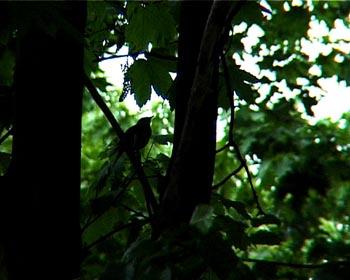Henrik Hakansson
dal 29/4/2003 al 6/6/2003
Segnalato da
29/4/2003
Henrik Hakansson
Index - the Swedish Contemporary Art Foundation, Stockholm
The coming of spring is heralded by more than just bird song and couples falling in love. On the eve of Walpurgis, Index opens an exhibition by Henrik Hakansson, an exhibition thematically commenting on this frenetic season. Henrik Hakansson's initial inspiration comes from the song of the nightingale and has resulted in a completely new film as well as a sound installation never before exhibited in Sweden.

The coming of spring is heralded by more than just bird song and couples
falling in love. On the eve of Walpurgis, Index opens an exhibition by
Henrik Hakansson, an exhibition thematically commenting on this frenetic
season. Henrik Hakansson's initial inspiration comes from the song of the
nightingale and has resulted in a completely new film as well as a sound
installation never before exhibited in Sweden.
Henrik Hakansson's film, Nightingale From Dusk Till Dawn (2003) portrays the
nightingale, a bird that according to popular legend is as easy to hear as
it is hard to see. However, by filming the bird at night with a simple,
hand-held camera including built-in infrared optics, Henrik Hakansson has
created a small, suggestive portrait of the bird. The sound and vision have
been edited to slow motion, with manipulations giving rise to remarkable
effects to both the audio and visual.
The concept of a voice is followed up in the exhibition's second work, the
sound installation Nightingale Love Two Times (2002), showing in the upper
gallery. Two vinyl records  the A and B sides respectively of the same
record  play beside each other. The A side is the artist's recording of a
nightingale on the Swedish island of Öland, the B side is it's close
relative, the southern nightingale, a recording made near Genova, Italy. The
southern nightingale is not at all common in northern climes  yet in Henrik
Hakansson's sound installation, these two species gives the impression that
it wants to communicate and cross boundaries in what appears to be a
hopeless love affair.
In his ecologically engaged art Henrik Hakansson has time-after-time
presented the problems around man's relationship to nature and the animal
kingdom and in addition the animal's relationship to its own reality. In the
series of works produced in recent years, a new form of expression has grown
stronger and more prevalent, a prioritisation of a relatively refined method
of relating to things. The most recent work, taking the form of film and
sound installations, reminds one of a minimalist tradition within film and
minimalist sound-experiments.
This year, the Swedish Ornithological Society presented an action plan aimed
at preserving the declining number of bird species in Sweden. Primarily, the
species most affected are those inhabiting rural and forest areas, but even
urban-dwelling birds are diminishing in number. In conjunction with the
exhibition, Henrik Hakansson and Index has conducted a pedagogic project in
collaboration with the Fredric Eens Minne pre-school. This follows and
surveys hatching processes in Nacka Nature Reserve during April and May.
Those who has an interest in visiting the area where Henrik Hakansson
carries out his research can contact the Index staff for further
information.
In conjunction with Henrik Hakansson's exhibition, Index would like to thank
Stockholm's Läns Bildningsförbund, the Swedish Ornithological Society, as
well as the children and staff of Fredric Eens Minne in Stockholm. Henrik
Hakansson is also exhibiting at Moderna Museet c/o Riddarhuset May 5 Â June
30.
For more information and press pictures, please contact Index. Index'
exhibition programme is curated by Andreas Gedin, Helena Holmberg, Mats
Stjernstedt and Niklas Östholm.
Opening Wednesday, 30 April, 5 Â 8 p.m.
open: tusday-sunday 12-4 pm
Index- The Swedish Contemporary Art Foundation
S:t Paulsgatan 3, Box 151 52, 104 65 Stockholm
tel: #468640 94 92, #468640 60 69



